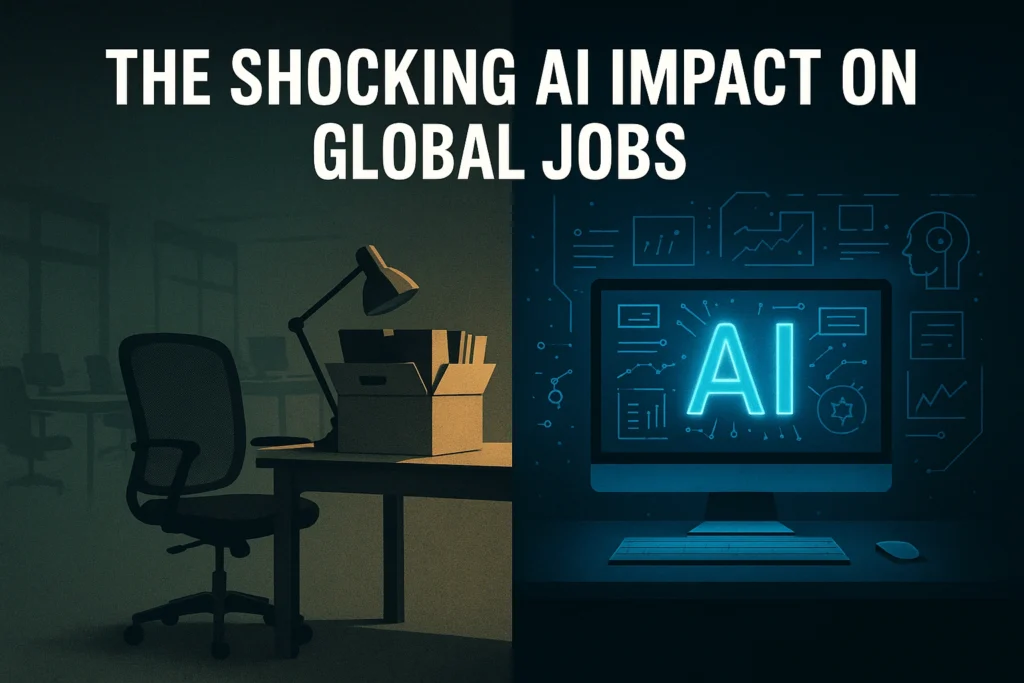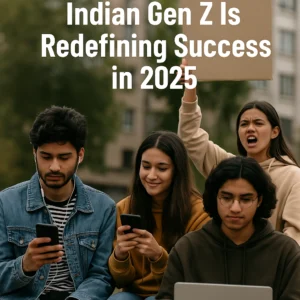Urgent Truth: The AI Impact on Global Jobs Is Bigger Than You Think

The growing AI impact on global jobs is quietly transforming workplaces around the world.
The AI impact on global jobs is no longer a distant prediction—it’s happening right now, often without warning or fanfare.
Earlier this year, employees at a growing marketing firm in Mumbai showed up to work only to find their access to internal tools disabled. Later that day, an internal message clarified that an AI-powered automation suite had been adopted, replacing 40% of the staff’s responsibilities. No meeting. No handover. Just an update, and an exit.
This isn’t an isolated case. It’s a pattern—a quiet restructuring that’s spreading through industries globally. The change is being driven not by governments or megacorporations, but by lean, fast-moving AI startups. These companies are rewriting the rules of labor at a speed that societies are struggling to keep up with. And at the center of it all lies one sobering reality: the AI impact on global jobs is already here, and most of us weren’t prepared.
A Quiet Shift Few Are Talking About
One morning earlier this year, employees at a mid-sized marketing firm in Mumbai found themselves logged out of their work systems. No warning. No memo. Within hours, the company announced it had adopted a new AI platform to handle campaign management and content delivery. The software would replace nearly 40% of the team’s responsibilities.
The reaction wasn’t outrage. It was confusion. People didn’t even realize their jobs had been automated until they were already gone.
That quiet replacement is now echoing across industries. AI startups—once seen as niche disruptors—are now steering how global workforces operate. They’re lean, fast, and capable of replacing entire departments with a single subscription. And the AI impact on global jobs isn’t just theoretical anymore. It’s visible on LinkedIn updates, in company emails, and in the growing silence on formerly busy Slack channels.The AI impact on global jobs isn’t just about layoffs—it’s about how work itself is being redefined. From job roles to required skills, the shift is structural, not seasonal.
Table of Contents
1. The New Disruptors Aren’t Who You Expect
We tend to associate world-changing tech with giants like Google or Microsoft. But in 2025, it’s often small, well-funded AI startups rewriting the rules.
These firms don’t make hardware or require massive data centers. They build digital tools that mimic—and often outperform—human tasks: customer queries, video editing, legal reviews, data summaries. A two-person startup in Berlin is now handling workflows that once needed 20 full-time staff. Investors are pouring in capital because the value proposition is irresistible: more output, fewer people.
But behind every investor deck and revenue chart is a line of workers left out of the equation. That’s the side of the AI revolution that rarely gets headlines.We’re seeing the AI impact on global jobs unfold unevenly—while some professionals adapt with new tools, others are left behind without access to training or opportunities.
2. The Human Layer Is Thinning
It’s no longer just manufacturing that’s feeling the pressure. Graphic designers, HR executives, content writers, voice-over artists, financial analysts—roles once considered “safe” or “creative”—are now being sliced into components and run through algorithms.
In Nairobi, an education startup cut its content team after adopting an AI course builder. In Warsaw, a travel agency now uses an AI assistant to manage bookings and customer queries—previously handled by a multilingual staff. These aren’t futuristic hypotheticals. They’re recent events, often unspoken but deeply felt.
The AI impact on global jobs is subtle but widespread. It’s not just about layoffs—it’s about erosion. A little less human involvement each quarter, until there’s almost none left.One thing is clear: the AI impact on global jobs isn’t temporary. It’s a systemic shift that’s forcing workers, educators, and employers to rethink their roles.
3. The False Promise of Retraining
Governments love to talk about “reskilling.” On paper, it sounds like a solution: retrain laid-off workers for the AI economy. But in practice, this approach often ignores the emotional and financial realities people face.
Imagine being a 42-year-old customer service rep in Manila, recently replaced by a chatbot, and told your future lies in “prompt engineering.” Who’s paying for that course? Who’s covering your rent while you learn it? Reskilling doesn’t help if the gap between what people can do and what AI can’t do grows wider every day.
India’s Skill India 2.0 program is a step in the right direction, but for rural or older workers with limited internet access or education, the digital leap is not so simple. The AI economy moves quickly—human adaptation does not.
4. In the Global South, Opportunity and Risk Walk Together
Emerging economies are in a tough spot. On one hand, they stand to gain from AI—India, Brazil, Nigeria all boast talented coders and large youth populations. On the other hand, they also house millions of low-wage jobs most vulnerable to AI-driven replacement.
What makes it more complex is that these same countries are building the AI tools that could displace them. It’s a strange paradox: the workers who power the AI boom may end up sidelined by it.
Without intentional policies and local investment in human-first innovation, the technology could simply widen the divide between those who build and those who are left behind.For policymakers, ignoring the AI impact on global jobs could mean widening economic inequality and a workforce ill-prepared for what’s coming next.
5. Why “Human-AI Collaboration” Isn’t Just a Buzzword
In some companies, the shift is being handled more thoughtfully. AI isn’t replacing people—it’s working alongside them. A journalist might use AI to transcribe an interview but still chase the story herself. A doctor might let an algorithm review scans but rely on his own judgment for the final diagnosis.
These collaborations are where AI shines—not in full automation, but in augmentation. Businesses like Salesforce and Accenture have embraced this mindset, investing in training programs that treat AI as a partner, not a replacement.
But this approach requires vision. It takes leadership that doesn’t measure success only in cost savings, but also in resilience, trust, and employee well-being.
Also read (Ukraine-Russia Conflict: Where June 2025 Stands in a War Without End )
The Future of Work Isn’t Inevitable. It’s a Choice.
The story of automation has always had two sides: innovation and loss. What makes this moment different is the speed and scope of change—and how invisible it often feels. No sirens, no protests. Just silence, logouts, and system updates.While the AI impact on global jobs is often framed in numbers and charts, it’s ultimately a human story—about livelihoods, dignity, and uncertainty.
AI doesn’t ask permission. It simply becomes more useful, more cost-effective, and more embedded into how business is done. The AI impact on global jobs won’t arrive all at once, like a tsunami. It will come as a slow tide—one that washes away familiar roles while shaping new ones in its wake.
But none of this is preordained. We still have time to shape how this story unfolds.
If companies choose to prioritize long-term trust over short-term margins, if governments fund meaningful reskilling—not just on paper but on the ground—and if societies demand that technology works with us, not against us, the future could still be one of shared prosperity.
Otherwise, we risk letting a handful of startups decide the fate of millions—quietly, line by line, in code we never see.
You can also read (Top AI Startups in 2025 )






2 thoughts on “Urgent Truth: The AI Impact on Global Jobs Is Bigger Than You Think”